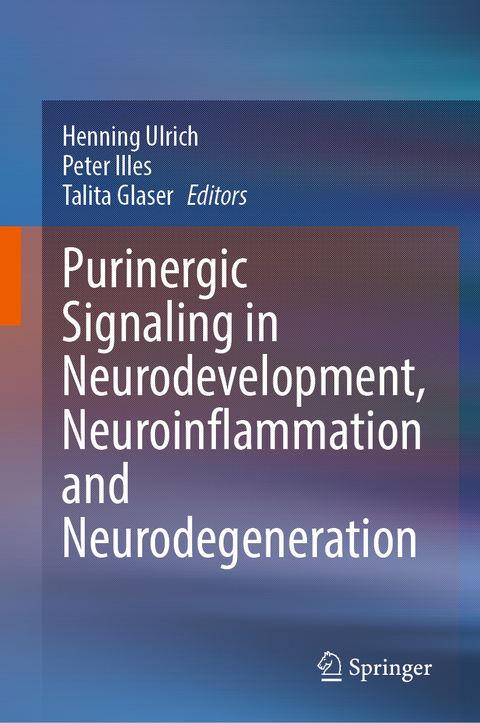
Purinergic Signaling in Neurodevelopment, Neuroinflammation and Neurodegeneration
Springer International Publishing (Verlag)
978-3-031-26944-8 (ISBN)
Prof. Henning Ulrich studied Biology at the Universities of Hamburg and Kiel (Germany) and performed his master thesis in Biochemical Parasitology, followed by a PhD in Biochemistry and Neuroscience at the University of Hamburg, Germany. He completed his training by postdoctoral research at the Centre of Molecular Neurobiology at the University of Hamburg and Cornell University, NY, the latter one financed by a fellowship of the American Heart Association. He came to the Institute of Chemistry at the Sao Paulo University as a visiting scientist, where he was then appointed as faculty member. He is Full Professor and head of the Laboratory of Neuroscience. He is internationally recognized for his work on purinergic signaling, stem cells and mechanisms of neurogenic differentiation and neurodegeneration. Dr. Ulrich has published more than 250 papers in peer-reviewed journals 4 books (3 of them published with Springer), 30 book chapters and participated in 4 patents. His research results were commented in major Brazilian newspapers. His is editorial board member of renowned journals, Associate Editor of Cytometry A, Academic Editor of PLoS ONE, Associate Editor of Purinergic Signalling, Section Editor of Stem Cell Reviews & Reports and Life. Prof. Peter Illes has studied medicine in Budapest at the Semmelweis University of Medicine and has been Associate Professor in the Department of Pharmacology of the University of Freiburg and afterwards Full Professor and Director of the Department of Pharmacology of the University of Leipzig, Germany. Presently he holds a Chair at the Chengdu University of Traditional Chinese Medicine, China. He has obtained numerous awards and distinctions; he is also member of several professional organizations such as the Academia Europaea or the Czech Learned Society. He has been awarded by honorary Doctorates in Budapest, Hungary, and Chengdu, China and with a number of Honorary Professorships. He is neuroscientist with special emphasis on two types of ATP-sensitive receptors, belonging to the P2X3 and P2X7 class. These receptors regulate pain sensation and neurodegenerative processes, respectively. Dr. Illes has published more than 400 papers in peer-reviewed journals and edited 3 books. He has been or is presently editorial board member of about 10 journals and is Editor-in-Chief of the Section Molecular Pharmacology of the International Journal of Molecular Sciences.
Dr. Talita Glaser studied Biology at São Paulo University (Brazil) and performed her PhD thesis in Biochemistry and Neuroscience at the same university. She completed her training during PhD in Kyoto University followed by postdoctoral research training at the University of São Paulo and Harvard Medical School. She is actually a postdoctoral fellow at the laboratory of Prof. Henning Ulrich at the University of São Paulo. Even as a young investigator, her work on purinergic signalling and stem cells are well cited and known internationally. Her expertise. Dr. Glaser has published more than 32 papers in peer-reviewed journals and 6 book chapters. The results of her research were commented in major Brazilian newspapers.
The Purinergic Signaling: Overview.- Adenosine A2A Receptor-containing Heteromers and Neuroprotection.- Purinergic Signaling in Brain Physiology.- Neurotrophic Actions of Adenosine and Guanosine: Implications for Neural Development and Regeneration?.- Purinergic Signaling in Neurogenesis and Neural Fate Determination: Current Knowledge and Future Challenges.- Purinergic Signaling in Autism Spectrum Disorder.- Purinergic Signaling in Depression.- Roles of Purinergic Receptors in Alzheimer's Disease.- Purinergic Signaling in Basal Ganglia Diseases: Parkinson's Disease.- A Step in the ALS Direction: Lessons from the Purinome.- Purinergic P2 Receptors in Epilepsy.- Purinergic Signaling in Neuroinflammation.- Purinergic Signaling in Brain Tumors.- Development of Purinergic Receptor Agonists and Antagonists.- Acupuncture for Counteracting P2X4 and P2X7 Receptor Involvement in Neuroinflammation.
| Erscheinungsdatum | 18.07.2023 |
|---|---|
| Zusatzinfo | X, 376 p. 34 illus., 3 illus. in color. |
| Verlagsort | Cham |
| Sprache | englisch |
| Maße | 155 x 235 mm |
| Gewicht | 739 g |
| Themenwelt | Medizin / Pharmazie ► Studium |
| Naturwissenschaften ► Biologie ► Humanbiologie | |
| Schlagworte | adenosine and aging • Alzeheimer's disease • Brain physiology • Depressive disorders • Ectonucleotidases • Huntington's disease • Neurodegeneration • neurodegenerative diseases • Neurogenesis • Parkinson's Disease • purinergic receptor agonist • purinergic receptor antagonistic development • Purinergic receptors • Purinergic signaling • Stem Cells |
| ISBN-10 | 3-031-26944-6 / 3031269446 |
| ISBN-13 | 978-3-031-26944-8 / 9783031269448 |
| Zustand | Neuware |
| Informationen gemäß Produktsicherheitsverordnung (GPSR) | |
| Haben Sie eine Frage zum Produkt? |
aus dem Bereich


